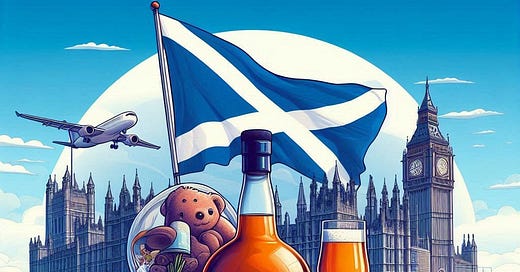🥕 Scotland’s Food & Drink Exports — Who Really Benefits?
Article 6 in the "Facts vs Fiction" series: The True Value of Scotland’s Exports
Scotland’s Food & Drink Sector — A Global Brand, Westminster’s Accounting Trick
Scotland has long been celebrated for its world-class food and drink, with a reputation for premium quality, sustainability, and heritage. From wild-caught seafood and prime beef to iconic products like shortbread, whisky, and gin, Scotland’s food and drink industry is not just a cultural pillar—it’s an economic powerhouse.
Yet Westminster consistently parades Scotland’s success as a UK-wide achievement while failing to acknowledge where the real profits go. Much of the value generated by Scotland’s exports is captured elsewhere—in London-based firms, English ports, and opaque UK-wide accounting rules.
This article unpacks the real story behind Scotland’s food & drink exports—who profits, who controls the markets, and how independence could unlock Scotland’s full trade potential.
Westminster’s Claims: The Official Narrative
The UK Government and trade bodies frequently highlight Scotland’s role in the wider British food and drink economy. According to official reports:
£16 billion in UK food & drink exports (2022), with Scotland contributing a significant share.
£8.1 billion worth of Scottish food & drink exports in 2022—the highest of any UK region.
Scotland’s top exports include whisky, salmon, beef, shellfish, and soft drinks.
This framing presents Scotland as a thriving part of the UK’s global trade network, reinforcing the idea that Scotland needs Westminster to maintain access to international markets.
Sounds reassuring on paper, right? But a closer look reveals a hidden reality—one in which Scotland’s food industry generates billions in wealth while receiving only a fraction of the benefits.
The Reality Behind the Numbers: Where the Profits Go
While Scotland’s food and drink sector is undeniably strong, the way exports are processed, recorded, and marketed under Westminster’s control means Scotland loses economic credit, political leverage, and financial returns.
1. Misattributed Exports: When Scotland’s Success Becomes “British”
Under UK-wide accounting systems, many Scottish products shipped through English ports (such as Felixstowe, Dover, and London Gateway) are often credited as English exports rather than Scottish ones.
👉 Example: Scottish seafood caught in Shetland, processed in Fraserburgh, shipped via Grimsby—yet it appears in trade reports as an English export.
This accounting trick artificially lowers Scotland’s official export numbers, allowing Westminster to inflate England’s trade statistics while making Scotland appear more dependent on UK trade infrastructure.
2. Trade Deals Scotland Never Signed
Post-Brexit trade agreements—negotiated entirely by Westminster—ignored Scotland’s specific needs, prioritizing large English agribusiness exports over Scotland’s premium produce.
Australia & New Zealand trade deals flooded the UK market with cheaper imports, undercutting Scottish lamb and beef producers who rely on premium pricing.
Volume over quality—Westminster’s global trade strategy favours high-volume, low-cost exports rather than Scotland’s focus on premium branding and niche markets.
Had Scotland controlled its own trade agreements, it could align deals with its strengths—targeting high-value markets rather than being forced into UK-wide trade priorities.
3. Brand Scotland, Managed by Westminster
Scotland’s reputation as a producer of clean, green, premium food and drink is an international selling point. Yet the UK Government dilutes Scotland’s brand under generic “British” marketing.
The phrase “British Produce” lacks the prestige of “Scottish” branding in key markets.
Marketing budgets and trade delegations are controlled by Westminster, meaning Scotland doesn’t always get a fair share of promotional efforts.
At major food expos and trade shows, Scottish products are often grouped under UK banners, weakening Scotland’s individual trade identity.
Scotland’s unique selling point in international food markets should be independent from UK branding, allowing it to maximize its premium value on the global stage.
4. Loss of EU Market Access
Brexit severely disrupted Scotland’s food exports—particularly for seafood and perishable goods.
Scottish shellfish exports to the EU dropped by up to 50% due to customs delays.
Products like langoustines and mussels faced spoilage and cancelled contracts because of new trade barriers.
EU buyers increasingly prefer Irish and Nordic suppliers, who have seamless single-market access.
Had Scotland remained in the EU—or rejoined via EFTA membership—these barriers wouldn’t exist, preserving Scotland’s strong European trade partnerships.
What Independence Offers: Unlocking Scotland’s Trade Potential
An independent Scotland could reshape its trade strategy to directly benefit Scottish producers, exporters, and consumers.
Scotland’s Own Trade Agreements
✅ Join EFTA or negotiate custom trade deals that prioritize Scottish goods—instead of accepting Westminster’s one-size-fits-none agreements.
✅ Target premium markets in Japan, North America, the Middle East, and the EU—where “Scottish” branding carries elite status.
Accurate Export Accounting
✅ Ensure Scottish goods are exported through Scottish ports and properly credited to Scotland in trade reports—stopping Westminster’s misattribution tactics.
True Scottish Food Branding
✅ Promote Scotland-only trade campaigns, ensuring global recognition for Scottish beef, seafood, whisky, and artisan products.
Investing in Domestic Infrastructure
✅ Expand Rosyth, Aberdeen, and Inverness as export hubs, reducing Scotland’s reliance on English ports.
✅ Develop Scottish trade offices and embassies dedicated to supporting direct international trade.
Conclusion: Scotland’s Wealth Must Stay in Scotland
Scotland’s food and drink exports are a national treasure, but under Westminster, the wealth leaks away at every stage—from mislabelled trade statistics to damaging UK-wide trade policies.
The UK Government profits off Scotland’s industry, yet Scottish farmers, fishers, and food producers face bureaucratic hurdles, lost branding opportunities, and shrinking global access.
Independence would allow Scotland to claim its rightful place in global food markets—controlling its own exports, its own profits, and its own future.





